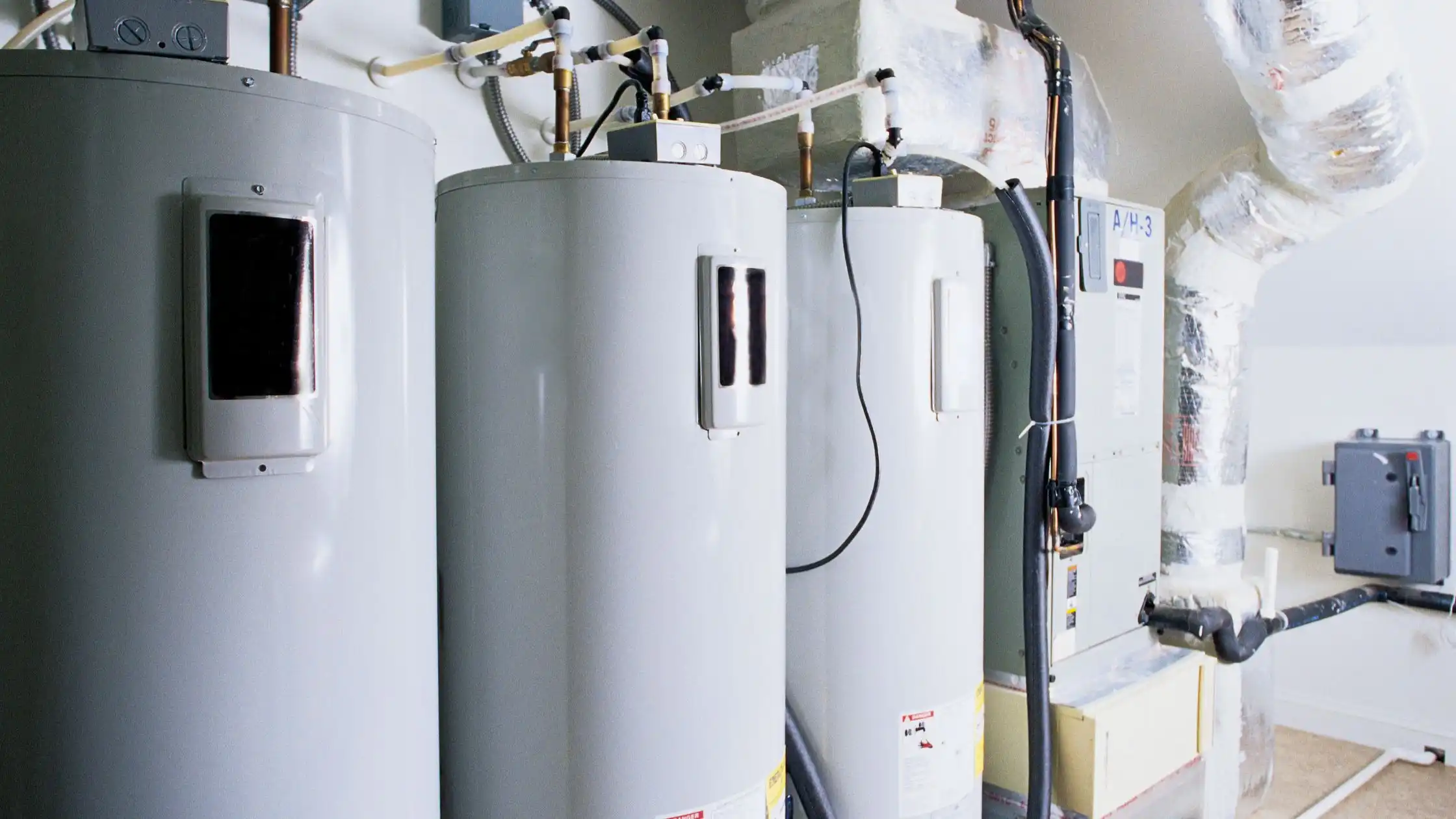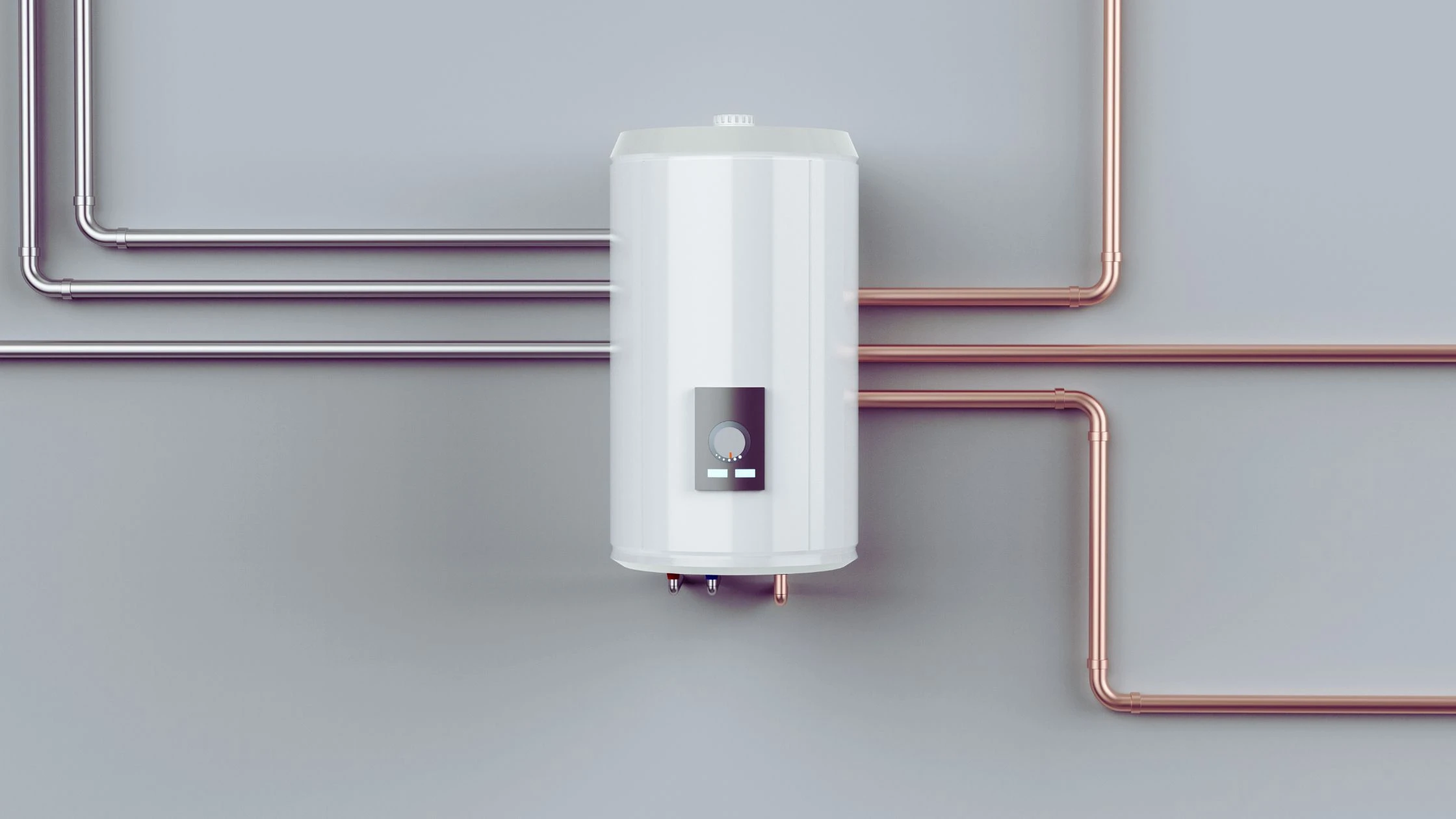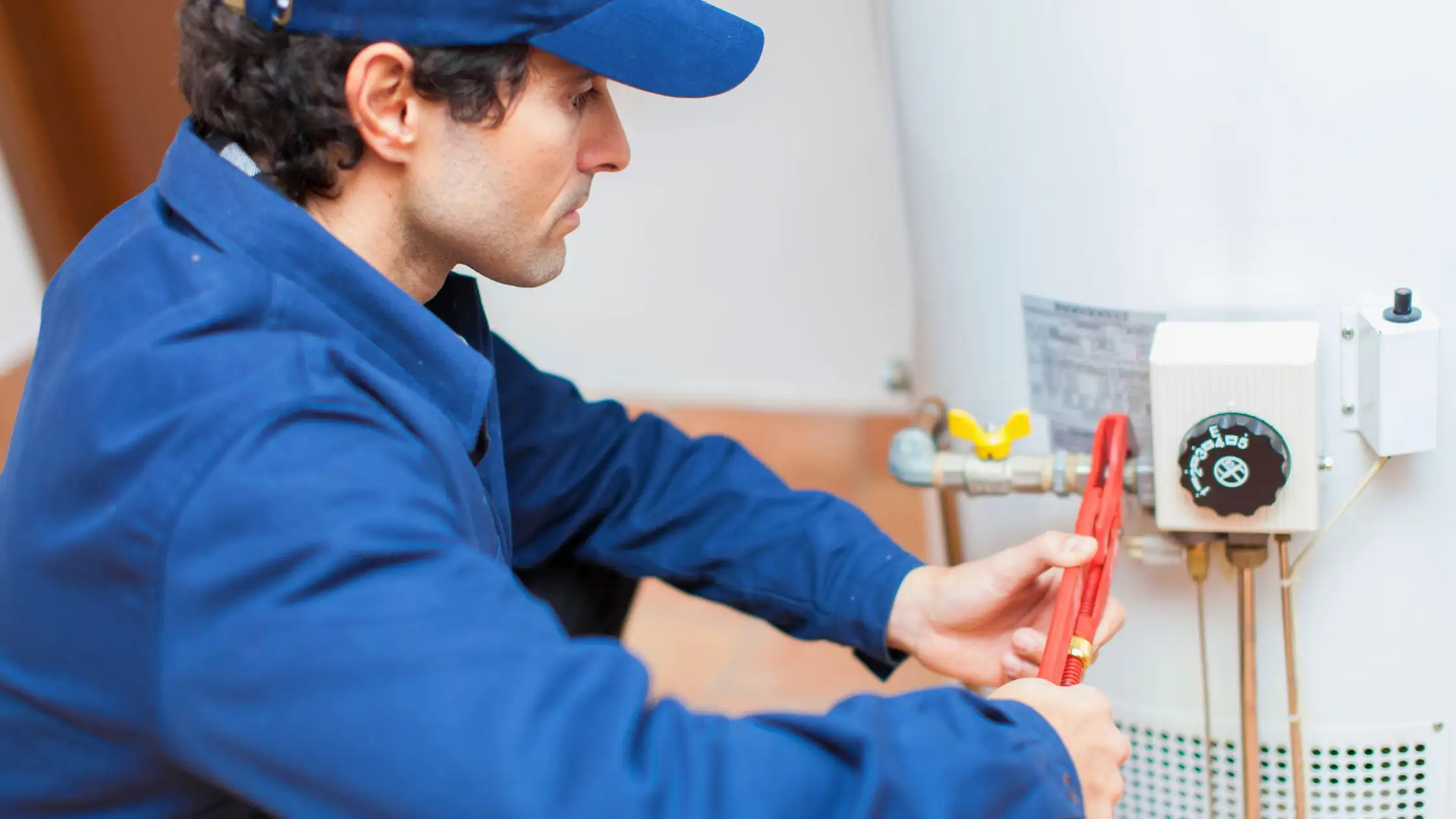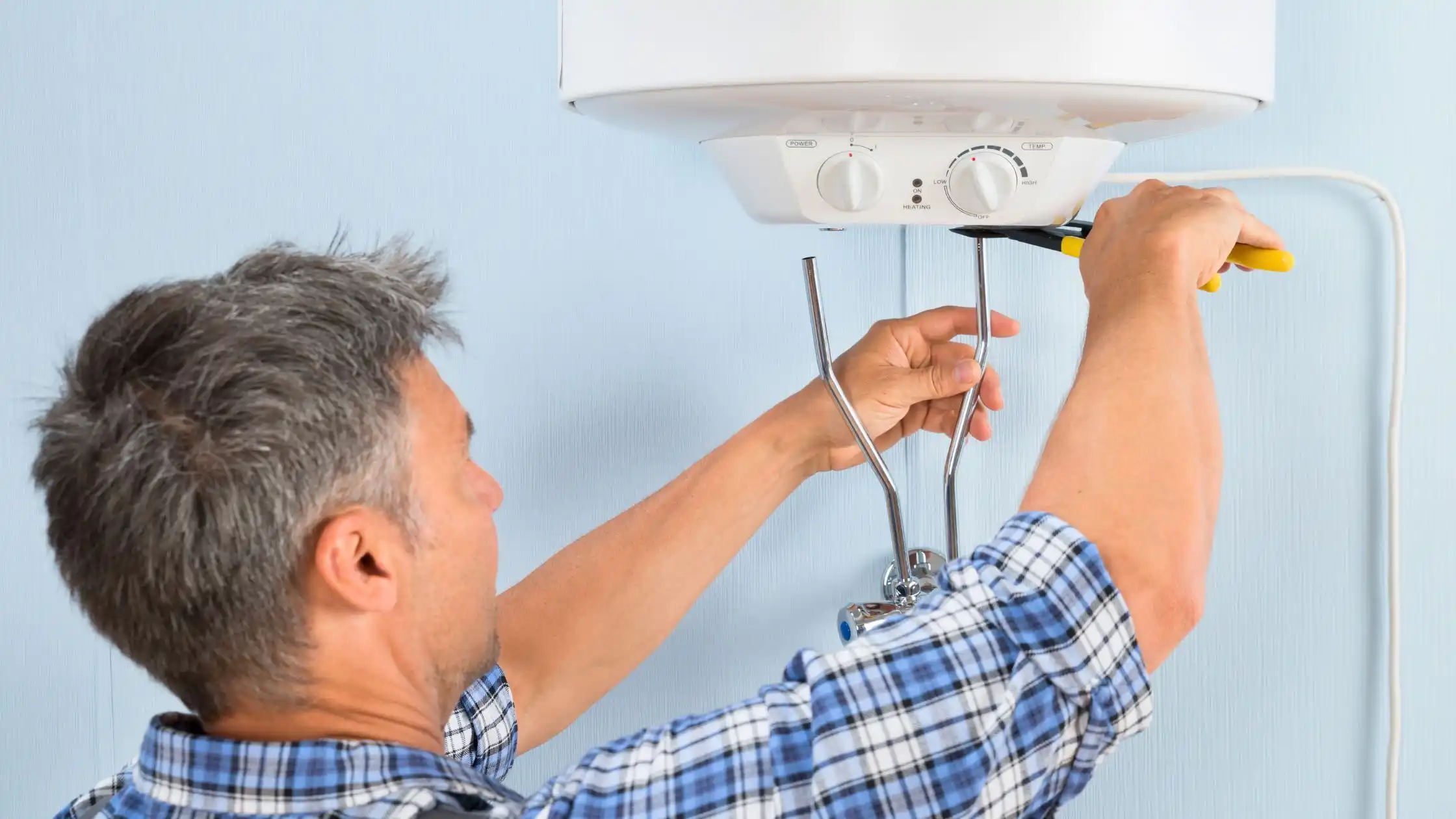Are you confused about the difference between a boiler and a water heater? You’re not alone. Many homeowners use these terms interchangeably, but they are distinct systems with different functions, benefits, and ideal applications. This comprehensive guide will help you understand the boiler vs water heater debate so you can decide on your home’s heating needs.
What’s the Difference Between a Boiler and a Water Heater?
Boilers and water heaters serve two fundamentally different purposes:
- Boilers heat water to create steam or hot water for heating homes through radiators, baseboard heaters or in-floor radiant systems.
- Water heaters are typically used to heat water for home uses such as showering, washing dishes, and doing laundry.
This fundamental difference affects everything from installation requirements to energy efficiency and maintenance needs. Let’s explore these differences in detail.
How Boilers Work: The Complete Breakdown
Boilers operate on a relatively simple principle but employ sophisticated technology to maximize efficiency and performance.
Basic Operating Principle
A boiler takes water and heats it up, either into hot water or steam, then circulates the heated water around your home through pipes that lead to radiators, baseboard heaters or radiant floor systems. The heated water or steam then sends heat to your living spaces, before returning to the boiler to be reheated.
Types of Boilers
For the house, there are various kinds of boilers:
1. Steam Boilers
Steam boilers heat water until it produces steam, which then rises through pipes to radiators around the home. As this steam cools, it becomes liquid water again and flows back to the boiler. Such systems are usually found in older homes.
2. Hot Water Boilers
More frequently used in recent installations, hot water boilers — sometimes referred to as hydronic boilers — heat water to temperatures usually between 145–190°F. The hot water is then pumped through piping to heating devices in your home.
3. Combi Boilers
Combination or “combi” boilers are capable of performing dual functions, providing space heating and domestic hot water all in a single lightweight unit, which means no need for a separate water heater.
Fuel Sources for Boilers
Boilers can be powered by various fuel sources:
- Natural gas
- Propane
- Oil
- Electricity
- Biomass (wood pellets or chips)
Natural gas is the most common fuel for residential boilers in areas where it’s available due to its relatively low cost and efficiency.
How Water Heaters Work: The Complete Breakdown
Water heaters serve a different purpose than boilers, focusing on providing hot water for daily household use.
Basic Operating Principle
Traditional water heaters have a tank where water is stored and heated at a set temperature for use. When you turn on a hot water tap, hot water is drawn off the top and cold water replaces it at the bottom, where it is heated.
Types of Water Heaters
The market offers several types of water heaters:
1. Conventional Storage Tank Water Heaters
These are the most traditional type, using an insulated tank where the water is heated and stored until use. They usually contain 30–80 gallons of water.
Also called on-demand water heaters, these units heat water directly without using a storage tank. When a hot water tap is turned on, cold water travels through a pipe into the unit, where it’s heated by gas burners or electric elements.
3. Heat Pump Water Heaters
These energy-saving units use electricity to transport heat from air or ground to warm water, rather than producing heat directly.
4. Solar Water Heaters
Typically used in combination with a backup system for cloudy days, they use the sun’s heat to warm water, making them eco-friendly but costly.
Fuel Sources for Water Heaters
Water heaters can be powered by:
- Natural gas
- Propane
- Electricity
- Solar energy
- Heat pump technology
Electric water heaters are common in many homes, though gas models typically cost less to operate in areas where natural gas is available.
Key Differences: Boiler vs Water Heater Comparison
Understanding the distinctions between these two systems will help you make the right choice for your home.
1. Purpose and Function
| Features | Boiler | Water Heater |
|---|---|---|
| Primary purpose | Home heating | Domestic hot water |
| Secondary functions | Can provide domestic hot water (combi systems) | Typically single-purpose |
| Operating temperature | 145-190°F (hot water) or 212°F+ (steam) | 120-140°F typically |
| Water circulation | Recirculates the same water | One-way flow of fresh water |
2. Installation Requirements
Boilers generally require more complex installation than water heaters:
- Boilers need piping throughout the home, radiators or radiant floor systems, and possibly zone valves for temperature control in different areas.
- Water heaters require simpler connections to the home’s existing water supply and usually only hot water lines to fixtures.
3. Energy Efficiency Considerations
Boiler Efficiency
High-efficiency condensing models are particularly significant, with efficiency ratings of 90-98% AFUE (Annual Fuel Utilization Efficiency) for modern boilers. These systems recover heat from exhaust gases that would otherwise go to waste.
Water Heater Efficiency
Traditional water heaters have energy factors of 0.5 to 0.7, and tankless models can go over 0.9. Heat pump water heaters have efficiency ratings of 2.0 or higher, so they provide double the amount of energy than what they consume.
4. Space Requirements
The physical footprint of each system varies considerably:
- Boilers typically require dedicated space in a basement, utility room, or closet. Modern wall-hung models have become more compact, but the overall system includes radiators or in-floor piping throughout the home.
- Water heaters range from large tank models (requiring similar space to a boiler) to compact tankless units that can be mounted on a wall to save floor space.
5. Lifespan and Durability
With proper maintenance, you can expect:
- Boilers: 15-30 years
- Water heaters: 8-15 years (tank), 20+ years (tankless)
Boilers generally last longer due to their construction and the fact that they recirculate the same water rather than constantly processing fresh water with minerals and sediment.
Cost Comparison: Boiler vs Water Heater
1. Initial Installation Costs
Comparing upfront expenses:
- Boilers: $3,500-$8,000+ installed
- Water heaters: $900-$1,500 (tank), $2,000-$4,500 (tankless) installed
The higher cost of boilers reflects their complexity and the additional components required for a complete heating system.
2. Operating Costs
Monthly expenses vary based on:
- Fuel costs in your area
- System efficiency
- Home size and insulation
- Climate and usage patterns
In general, high-efficiency boilers can provide lower operating costs for home heating compared to electric resistance heating but may cost more than using a heat pump for both heating and cooling.
3. Maintenance Requirements and Costs
Regular maintenance is essential for both systems:
- Boilers need to be serviced by a professional yearly (around $200-300) to test safety systems, clean parts, and make sure everything works properly.
- Water heaters also require annual maintenance (about $80-150), such as flushing the tank to eliminate sediment buildup and inspecting anode rods.
Pros and Cons: Boiler vs Water Heater
Advantages and Disadvantages of Boilers
| Advantages | Disadvantages |
|---|---|
| Even, comfortable heat without the dryness associated with forced-air systems | Higher upfront cost for equipment and installation |
| Zone control for different temperatures in different areas of your home | No built-in air conditioning capability |
| Silent operation compared to forced-air systems | Slower response time to temperature changes |
| Better for allergies since they don’t circulate dust and allergens | More complex repairs often requiring specialized technicians |
| Longer lifespan with proper maintenance | Risk of freezing pipes in extreme cold if system fails |
Advantages and Disadvantages of Water Heaters
| Advantages | Disadvantages |
|---|---|
| Lower initial investment | Single-purpose functionality |
| Simpler installation process | Shorter lifespan than boilers |
| Easier and less expensive repairs | Limited hot water capacity with tank models |
| Compact options available (especially tankless models) | Higher operating costs with some fuel types |
| Can be combined with other heating systems seamlessly | Potential for standby heat loss in conventional tank models |
Which Regions Benefit Most from Boilers vs Water Heaters?
The climate in your area plays a significant role in determining which system might be more suitable.
Cold Climate Considerations
In regions with harsh winters like the Northeast, Midwest, and Northern states, boilers offer several advantages:
- More consistent heating during extreme cold
- Better freeze protection since water continuously circulates
- Higher comfort levels during extended cold periods
- Often more economical for primary heating in very cold areas
Moderate Climate Considerations
In regions with milder winters like the Southeast, Southwest, and West Coast:
- The high installation cost of a boiler may not be justified
- Standard water heaters paired with separate heating systems may be more cost-effective
- Tankless water heaters can provide efficient hot water without the space requirements of a tank
Upgrading or Replacing Boiler vs Water Heater
When to Replace a Boiler
Consider replacing your boiler when:
- It’s more than 15-20 years old
- Repairs become frequent and expensive
- Energy bills are steadily increasing
- Heating is uneven or inadequate
- Strange noises or smells develop
When to Replace a Water Heater
Look for these warning signs:
- Age exceeds 10 years
- Rusty water from hot taps
- Rumbling or banging noises
- Visible leaks or moisture around the unit
- Decreasing hot water capacity
- Rising energy bills
Conversion Considerations: Switching Between Systems
Changing from one system to another is a major undertaking:
- From boiler to water heater + separate heating: Requires removing radiators/piping and installing new heating system plus water heater
- From water heater to boiler system: Necessitates installing extensive piping and radiators/radiant systems throughout the home
These conversions typically cost significantly more than a like-for-like replacement and may require structural modifications to your home.
Making Your Decision: Boiler vs Water Heater
When choosing between a boiler and a water heater, consider these factors:
1. Assess Your Specific Needs
- Primary purpose: Whole-home heating or just domestic hot water?
- Family size: Larger families need greater hot water capacity
- Home layout: Multi-story homes may benefit from zone-controlled boiler systems
- Existing infrastructure: Converting from one system to another is costly
2. Consult with Professionals
Before making a final decision:
- Have your home evaluated by qualified HVAC professionals
- Request detailed quotes for different options
- Ask about incentives, rebates, and tax credits for high-efficiency systems
- Consider long-term operating costs, not just installation expenses
3. Consider Future Plans
Think about:
- How long you plan to stay in your home
- Potential energy price changes in your area
- Family growth or lifestyle changes that might affect your hot water needs
- Your budget for both immediate and long-term expenses
Final Words: Choosing the Right System for Your Home
There is no one-size-fits-all answer to the boiler vs water heater dilemma. The method that works best for you will depend on your individual preferences, home features, location and budget.
The modern high efficiency boiler system will provide comprehensive home heating along with the added capability of domestic hot water generation in the home, this provides comfort and longevity with efficiency that is becoming more and more cost competitive. For more modest domestic hot water requirements, a well-specified water heater offers an economical solution which can be integrated with different types of heating systems.
Keep in mind that improving energy efficiency in your home in the first place — through better insulation, sealing air leaks, upgrading windows and so on — will shrink the size and therefore the cost of either system while also improving comfort and lowering operating costs.
FAQs on Boiler vs Water Heater
Can a Boiler Heat Domestic Water?
Yes, boilers can heat water for domestic use through:
1. Combi boiler systems that handle both functions
2. Indirect water heater setups using the boiler as the heat source
3. Heat exchanger technology that separates heating water from domestic water
Can a Water Heater Heat My Home?
Standard water heaters aren’t designed to heat homes. However:
1. Some specialized high-capacity water heaters can supply radiant floor systems
2. These applications are limited and generally not as efficient as dedicated boilers
3. They’re typically only suitable for very small spaces or supplemental heating
Boiler vs Water Heater: Which is more efficient?
The answer depends on many factors:
1. Modern condensing boilers achieve higher efficiency ratings than standard water heaters
2. Heat pump water heaters can be exceptionally efficient but serve a different purpose
3. System design, insulation, and usage patterns all affect real-world efficiency
4. For whole-home heating, properly sized and installed boilers typically provide better efficiency









